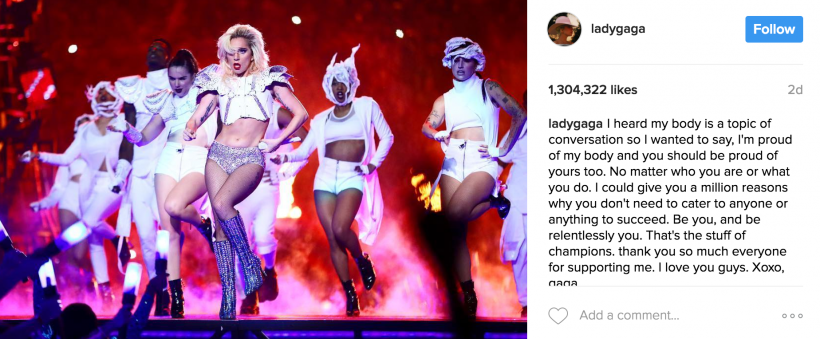
image credit: Lady Gaga via Instagram
After performing her ass off at the half-time show of Super Bowl LI, Lady Gaga was body shamed by the kind of people who think their opinions about women’s bodies matter, and who want to attract other sexist misogynist assholes by taking to the internet to show off their bigotry. Though they are a plague worth ending, I’m not focusing on them today. What I want to talk about are the “Body Positive” responses, because the Body Positive community has some serious problems, and those problems tend to perpetuate exactly what we want to be fighting.
The Body Positive (BoPo) movement as it often appears today is a watered-down version of the much more radical Fat Acceptance movement. BoPo inherited problems that Fat Acceptance had and still has, including a lack of inclusion and centering of the voices of People of Color, disabled people/people with disabilities, and Trans and Non-Binary people. And in seeking to apply the concepts of Fat Acceptance to people of all sizes, BoPo created new problems as well as exacerbating old ones which tend to exclude those who are most oppressed because of their bodies.
...Health is not an obligation, a barometer of worthiness, or entirely within our control.
It’s one thing to expand a movement; it’s quite another to co-opt it and then exclude those who founded it. Too many people believe that the Body Positive movement comes with exceptions that exclude people who they feel are “just too fat” or who don’t perform “health” to their satisfaction.
Too often people claim that they are practicing Body Positivity when in fact they are perpetuating fatphobia and/or using healthism and ableism to justify sizeism. Let’s look at a few typical examples:
It’s ok to love your body as long as you’re healthy.
Nope, Nope, Nope-ity Nope. Nobody is obligated to love their body, and seeking another option (whether it’s body neutrality or something else) is totally okay. But loving our bodies is always an option. It’s okay to love yourself, period.
Not to mention, health is not an obligation, a barometer of worthiness, or entirely within our control. There are healthy and unhealthy people of all sizes — regardless of what definition of “health” one might be using. There is no health status that negates our right to love our body.
It’s ok as long as you’re not (insert number of pounds that seems like “a lot” to the speaker) and you don’t have (insert a disability or mobility challenge).
This is super gross, and we need to knock this shit off immediately and forever. Kimberlé Williams Crenshaw coined the term “intersectionality” to describe the situation in which if you're standing in the path of multiple forms of exclusion, you're likely to get hit by both.
Crushing oppression lies at the intersections of being fat and being disabled/having a disability. This is because we live in a world that is both ableist and sizeist, and where people think it’s okay to oppress someone who has a disability if that person is also fat. This means that fat people who use mobility aids are often scared to leave their homes lest they end up in some cruel Facebook meme. It means that Superfat people are oppressed by a world that isn’t made to accommodate them, and by those who are blatantly fatphobic, and by those who put a size limit on body positivity.
Arguing against fat shaming by saying “they aren’t fat” or “they aren’t that fat.”
Lady Gaga isn’t fat by any definition. But when we make that our argument against her being fat-shamed, we also — however unintentionally — continue to perpetuate the idea that being fat is a bad thing. The trolls who call her fat are also aware that she isn’t, they are using the word fat as an insult, and if we truly believe in body positivity, then that’s what we must argue against.
When someone tries to use fat as an insult, we can fight back against that specifically by saying something like, “So what if she is, there’s nothing wrong with being fat.”
By the way, Lady Gaga’s response on Instagram was pretty great:
“I heard my body is a topic of conversation so I wanted to say, I'm proud of my body and you should be proud of yours too. No matter who you are or what you do. I could give you a million reasons why you don't need to cater to anyone or anything to succeed. Be you, and be relentlessly you. That's the stuff of champions. thank you so much everyone for supporting me. I love you guys. Xoxo, gaga”
I know that nobody is immune from the body shaming culture in which we live.
The fact that Lady Gaga was fat-shamed is a pretty good example of that. One of the ways that patriarchy works is to create a situation in which there is no way to win, thus setting up the rest of us to fight each other for scraps while they run away with the steaks.
While my focus is more on the Fat Acceptance side, I’m not against also being part of a Body Positive movement that makes sure that everyone of every size knows that they can love their body, but that movement needs to acknowledge privilege, including relative privilege.
That means understanding that people who are thinner, cisgender, white, viewed as “healthy” and/or “able-bodied,” have more relative privilege than those who are larger, Trans or Non-Binary, People of Color, or viewed as “unhealthy” or “disabled.”
This is not just in terms of how these groups are treated, but also in terms of the ways in which the world is created to accommodate them (everything from chairs, to government documents, to healthcare equipment). It means understanding that relationships with bodies can be complicated by things like skin color, chronic illness, disability, and being Trans or Non-Binary in a racist, healthist, ableist, transphobic world.
Half-assed body positivity for cis, het, white, “able-bodied,” not-that-fat, “healthy” people isn’t what we need. Telling people to just “love their body” isn’t what we need.
Body Positivity can be about loving our own bodies, but it must also be about creating a world without racism, healthism, ableism, sizeism, transphobia, or unattainable stereotypes of beauty. It must be about creating a world where people have access to the things that they need — including healthcare — to treat their bodies as they choose to treat them.
And we can’t just show up for the Lady Gagas of the world; we also need to show up for the people of every size.








